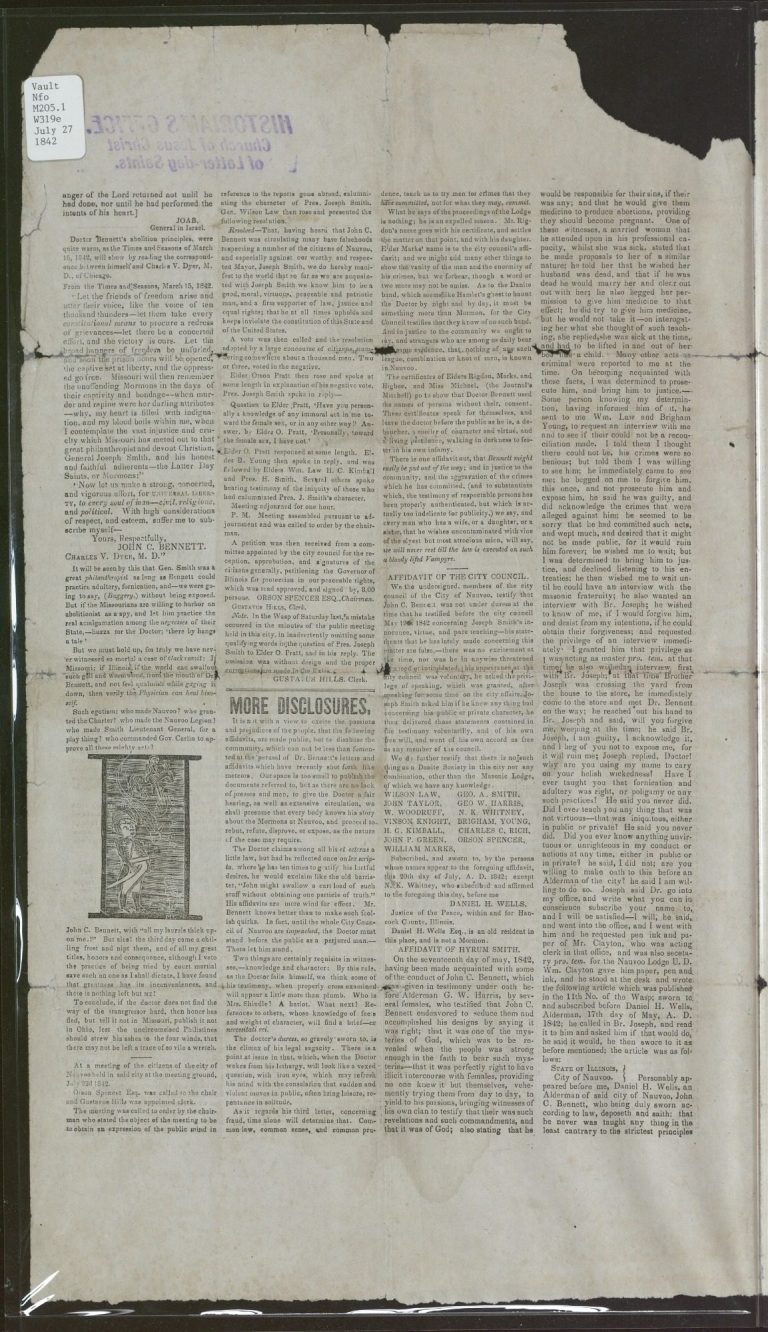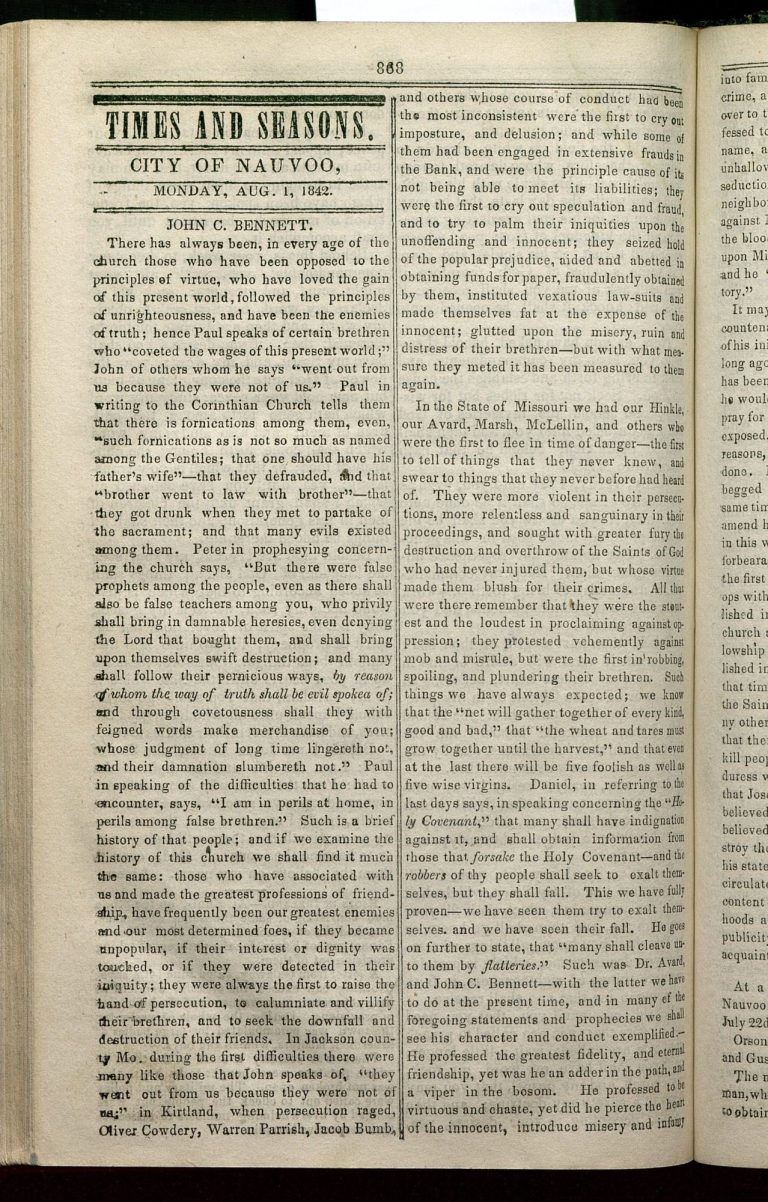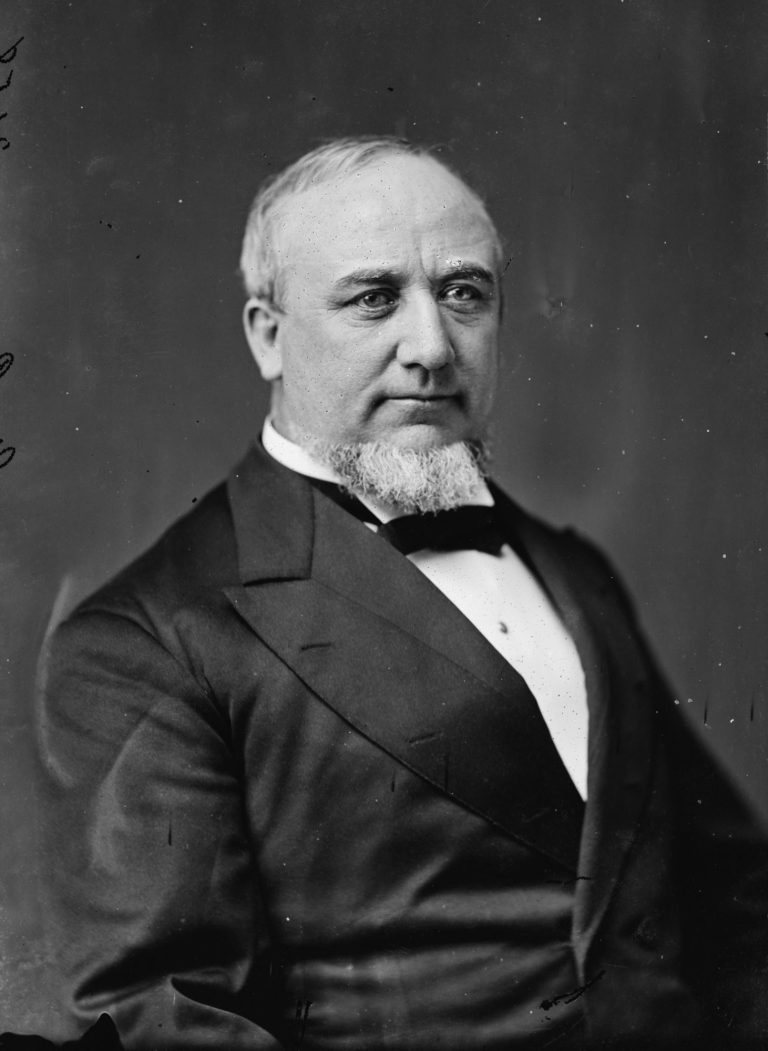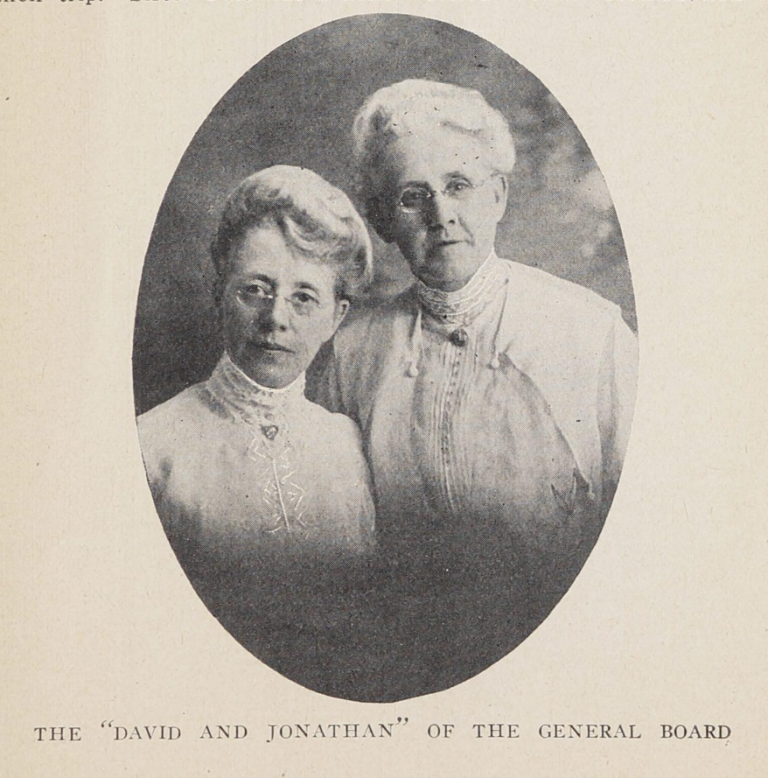lgbtq
in Mormon History & Theology
From 1830-1995
What are the teachings of the Church of Jesus Christ of Latter-day Saints in regards to LGBTQIA?
How has the church handled this in its history?

First Recorded Discipline of Same-Sex Activity
The first alleged account of discipline for sodomy (referred to as buggery) involved the May 1842 excommunications of John C. Bennett and Francis Higbee. John C. Bennett, was an influential friend of the prophet Joseph Smith. Professionally, Bennett was a trained physician and provided medical services to the city of Nauvoo. John Bennett also served as the Mayor of Nauvoo, Illinois and Major-General of the Nauvoo Legion. William Smith, the brother of the Prophet publicly accused Bennett of having sexual relations with men. Historians also record that Joseph Smith caught Bennett having sex with 21-year-old Francis Higbee on July 4, 1841. Bennett was also accused of seducing the “sisters” of Nauvoo, leading historians to believe he was not a homosexual in the modern sense but rather polyamorous or bisexual; open to a variety of sexual experiences. Church records confirm that Higbee and Bennett were excommunicated: guilty of “a crime not fit to be named.”
The Saintly Scoundrel: The Life and Times of Dr. John Cook Bennett by Andrew F Smith
John C. Bennett accused Joseph Smith of "Buggery"
Shortly after John C. Bennett was excommunicated for buggery, Bennett publicly accused Joseph Smith of also having sexual relationships with men. Bennett published his accusations in a church newspaper called The Wasp. In July of 1842 the citizens of Nauvoo met to “manifest to the world that so far as we are acquainted with Joseph Smith, we know him to be a good, moral, virtuous, peaceable and patriotic man, and a firm supporter of the law, justice, and equal rights; that he at all times upholds and keeps inviolate the constitution of this State and of the United States.” A vote among the citizens was called to affirm the statement dignifying Joseph Smith and exonerating him of the charges of buggery.
Three people voted against affirming Joseph Smith. One of those three dissenters was Elder Orson Pratt, an apostle.
“Pres. Joseph Smith spoke in reply [on July 22, 1842]—Question to Elder Pratt, "'Have you personally a knowledge of any immoral act in me toward the female sex, or in any other way?' Answer, by Elder Pratt, 'Personally, toward the female sex, I have not.'" Since The Wasp had already raised the topic of Bennett's 'buggery' and the prophet's alleged toleration and participation of it, Joseph Smith's 'in any other way?' was an implicit challenge for Pratt to charge him with 'buggery' as well. Pratt declined to answer whether Joseph Smith had committed 'any immoral act' with someone other than a woman, but also declined to exonerate the prophet form such a charge.
The Joseph Smith Papers Times And Seasons, August 1, 1842, p. 869
The Wasp
July 1842
Charles V. Dyer, M. D.”19
It will be seen by this that Gen. Smith was a great philanthropist as long as Bennett could practice adultery, fornication, and—we were going to say, (Buggery,) without being exposed. But if the Missourians are willing to harbor an abolitionist as a spy, and let him practice the real amalgamation among the negresses of their State,—huzza for the Doctor; ‘there by hangs a tale’


Times and Seasons
August 1, 1842
Resolved—That, having heard that John C. Bennett was circulating many base falsehoods respecting a number of the citizens of Nauvoo, and especially against our worthy and respected Mayor, Joseph Smith, we do hereby manifest to the world that so far as we are acquainted with Joseph Smith we know him to be a good, moral, virtuous, peaceable and patriotic man, and a firm supporter of law, justice and equal rights; that he at all times upholds and keeps inviolate the constitution of this State and of the United States.
A vote was then called and the resolution adopted by a large concourse of citizens, numbering somewhere about a thousand men. Two or three, voted in the negative.
Elder Orson Pratt then rose and spoke atsome length in explanation of his negative vote.Pres. Joseph Smith spoke in reply—
Question to Elder Pratt, ‘Have you personally a knowledge of any immoral act in me toward the female sex, or in any other way?’ Answer, by Elder O. Pratt, ‘Personally, toward the female sex, I have not.’
Sodomy Laws in the Utah Territory
Sodomy Laws in the Utah Territory: Castrations Ordered by Brigham Young
The first law to address sodomy in Utah was written in 1851. The criminal code specifically prohibited any “man or boy” from engaging in, or attempting to engage in, “any sexual intercourse with any of the male creation.” (Laws and Ordinances 1919)
The 1851 law was found to be unenforceable and the new 1852 code removed the 1851 sodomy language. Because sodomy was no longer mentioned in the law, it was thereby legal in the Utah Territory.
Early Utah records suggest a religious stigma attached to homosexuality (buggery/sodomy) throughout the Utah Territory—even though the government of the territory showed no further interest in outlawing it. Females (lesbians) were not held to the same standard enforced against men regarding the original sodomy law—especially in religious circles.
As an example: in 1856 a married woman from Salt Lake City was publicly accused of trying to seduce the daughter of a local man but no charges were ever brought against her. However, only a year later, a man was brought before the law and his church leaders, the man was castrated for sodomy. Even though the government (which was also run by Latter-day Saint Church leaders) did enforce new sodomy laws, the Church of Jesus Christ began to mete out penalties of their own. From 1857 to 1859 there were at least three castrations sanctioned by Brigham Young, the president of the Church. In February of 1876 the Utah territory legislature enacted laws that once again criminalized sodomy—defined as anal sex. If found guilty, the penalty was 10 years imprisonment.
Chuck Stewart “Proud Heritage: People, Issues, and Documents of the LGBT Experience” p. 1200

Parley P. Pratt
Journal of Discourses
10 April 1853
"… or if we, like the Sodomites or Canaanites, were full of all manner of lawless abominations, holding promiscuous intercourse with the similar sex, and stooping to a level with the brute creation, and predisposing our children, by every means in our power, to be fully given to strange and unnatural lusts, appetites, and passions, would it not be a mercy to cut us off, root and branch, and thus put an end to our increase upon the earth? You will all say it would. The spirits in heaven would thank God for preventing them from being born into the world under such circumstances. … Yes, they would; for they could say—"Now there is an opportunity for us to take bodies in the lineage of a noble race, and to be educated in the true science of life, and in the commandments of God." O what an unspeakable contrast, between being a child of Sodom, and a child of Abraham!”
Parley P. Pratt Quorum of the Twelve Apostles Journal of Discourses 10 April 1853, “Heirship and Priesthood,” p. 259
Almerin Grow
From The Life of Amos Musser
Church historian A. Milton Musser wrote in his personal journal, the story of how he came to adopt a daughter. Musser’s journal entry might indicate the first written account of transgenderism (or gender non-conforming dress) in the Salt Lake Valley and the subsequent response by the President of the Church, Brigham Young.
“Almerin Grow has given me his daughter (now twelve years old) to raise. He has appointed me as her guardian. Prest Young has given him a mission to “go south and never return.” Though naturally smart, he has become immeasurably insane … wearing his wifes clothing, etc.”
Almerin was expelled by Brigham Young in 1858 and lost custody to all of his children. Grow continued to petition Brigham Young for custody of his children in exchange for being expelled from Salt Lake. Brigham Young never granted his repeated requests. Almerin Grow died at the age of 91 in California, having never returned to Salt Lake City.
[The Life of Amos Musser, pg. 71]
A. Milton Musser Musser Writings |
Church History Vol. VIII p. 31


George Q. Cannon
April 1879 General Conference
"I consider our false tradition upon this subject one of the greatest evils at the present time that exists upon the earth. It has come down to us from the Greeks and Romans, than whom a more abominable lot of people never lived upon the earth. To read their books is enough to make a man with the least feeling of modesty blush and be ashamed of his race. Yet they are introduced into our literature. Whoever reads Horace, Sallust, and numbers of those authors, well knows how full of corruption they are. Not only crimes, but crimes against nature were justified by some of the best and most noted of Greek philosophers, and were practiced by Sophocles, Socrates, and others; and yet this is the philosophy that has come down to us.
"They had a class of women in their midst who were regularly compensated and sustained as courtesans; they were maintained in order that the purity of the domestic circle might be unpolluted. And this has come down to us in Christendom, in Europe and America to the present time. The fairest of Earth's daughters fall yearly sacrifices to the abominable lusts of men. How is the domestic circle preserved in monogamous countries today? It is only preserved at the expense of this class to which I have referred, by these priestesses of humanity, blasted for the sins of the people, living short lives and carrying with them the effects of man's abominable lust.
“But it is a most difficult thing to get these Latter-day Saints to understand the principles that are as plain as the noonday sun—that they should receive readily, and why? Because, as I have said, they are heirs of the traditions of centuries that have come down through the dark ages. It is a wonderful thing to do what we have done respecting woman. Look at what monogamy has done. Look at its effects; trace its influence from the death of the Apostles, or soon afterwards, down to this the nineteenth century, and what do we behold? Why, in every generation a large percentage of our sisters has been consigned either to that nameless condition of which it is a shame to speak, or have died without ever knowing the joys of maternity.”
Arthur Bruce Taylor
November 1879
In November 1879, President Joseph F. Smith held a “long discussion” with 26-year-old Arthur Bruce Taylor, the eldest son of President John Taylor, prophet of the Church. At the conclusion of the meeting, President Smith wrote detailed notes about the conversation in his personal journal. Among the writings was the acknowledgement that [Arthur] Bruce Taylor was admittedly “acane!”

Joseph F. Smith had served his mission in Hawai'i and developed a habit of using Hawai'ian words in his writings -especially for sensitive topics.
Aikāne refers to: ai or intimate sexual male relationship; and kāne or male/husband. Among men, the sexual relationships usually begin when the partners are teens and continue throughout their lives. One who is labeled aikane is unashamed of their sexuality or experience. In Hawai’ian culture, there is no stigma attached to those who are aikāine. The relationships were official and in no way hidden. The sexual relationship was considered natural by the Hawaiians of that time. Hawaiians had created a social structure that maximized harmonious living by embracing all ohana (family) and sanctioning many types of relationships, including aikāne (same-sex love), māhū (transgender people), hānai (adoption), and punalua (multiple lovers).
Shortly after A. Bruce Taylor’s meeting with Joseph F. Smith, he moved away from Salt Lake City and relocated to Baker City, Oregon where he practiced law. Bruce Taylor died in 1934 at the age of 80. He never married.

Joseph F. Smith
September 4, 1882
September 4, 1882, Joseph F. Smith, then a member of the First Presidency was made aware of a group of teenage males in the Richfield, Utah Stake that were “actively” engaged in homosexual activities. President Smith’s response to the stake presidency was pointed:
“Get the names of all of them & cut them off the church for obscene, filthy & horrible practices.” To the group of young men, Joseph F. Smith referred to the activity as a “monstrous iniquity, for which Sodom & Gomorrah were burned with fire sent down from heaven.”
In this statement, Joseph F. Smith made a complete reversal of his prophet-uncle’s non-sexual interpretation of Sodom’s destruction. Parley P. Pratt and George Q. Cannon also pushed this familiar narrative, deviating from Joseph Smith’s teachings on the subject.
Joseph F. Smith 2nd Counselor in the First Presidency Joseph F. Smith Family Papers 1860-1944 September 1882 Cited by D. Michael Quinn Same-Sex Dynamics among Nineteenth-Century Americans: A Mormon Example
Louie Felt &
May Anderson
In the October 1919 issue of the Children's Friend magazine,
Sarah Louise (Louie) Bouton Felt

© Copyright. All rights reserved.
We need your consent to load the translations
We use a third-party service to translate the website content that may collect data about your activity. Please review the details in the privacy policy and accept the service to view the translations.